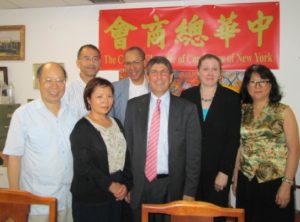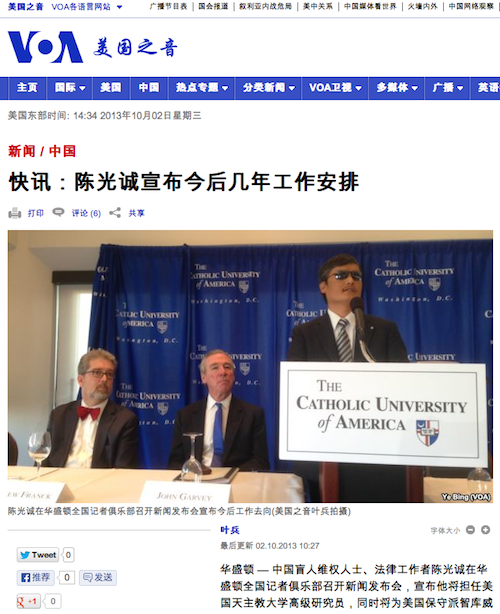BBG Watch Commentary
In a continuing saga of top-level mismanagement and provincialism in news reporting to audiences overseas, the Voice of America (VOA) English website did not report yesterday (October 1) or today (October 2, as of 4:30PM Washington DC time) that blind Chinese human rights activist and dissident Chen Guangcheng will join the Witherspoon Institute, a US think-tank, as a distinguished fellow, and would also be affiliated with the Catholic University of America and the Lantos Foundation for Human Rights and Justice.
Chen Guangcheng linked his earlier departure from New York University, where he had been offered a scholarship after escaping from house arrest in China last year, to “unrelenting pressure” from Beijing. New York University denied that it submitted to pressure from the Chinese government and said that Chen Guangcheng’s scholarship was only to last one year. It was not renewed. There were also charges, which New York University denies, that its officials tried to limit Chen Guangcheng’s contacts with U.S. media and U.S. public while he was a guest at the university.
While the Voice of America English website ignored or missed this news, the BBC English website posted Tuesday, October 1, a news item about Mr. Chen and his new academic affiliation in the United States.
It is both ironic and incredible that BBC, a British broadcaster, would cover on its English website this primarily American news story, while the Voice of America English news service, which is funded by U.S. taxpayers, would not, even though the event took place in Washington, DC, where VOA headquarters are located.
U.S. taxpayers expect the Voice of America to cover human-rights related news stories to many countries overseas that face government-imposed press censorship. VOA English news editors either missed the story, like they had missed many similar ones in the past, or they did not think it was important enough for English-speaking Internet users in countries like Iran and many other countries where other dissidents like Chen Guangcheng are waging their own battles for human rights and often end up in prison.
In the United States, The Washington Post website and many other mainstream media news sites posted the story, as did The Guardian in the UK and South China Morning Post in Hong Kong. Obviously other news editors thought that the story was interesting and important enough, even for people in the United States and in Great Britain.
It is almost certain that because the VOA English news did not carry the story, no other VOA language service, other than the Chinese service, had it on its website. The VOA Tibetan service English website did not have any recent reports on Chen Guangcheng. We could not check every VOA foreign language website, but it does not appear that any of them (other than the Chinese website) reported on the story. We could not find the story on the VOA Tibetan-language website, VOA Burmese website or on VOA Cambodian service Khmer-language and English-language websites.
Foreign audiences in Asia and in other countries could not learn from the Voice of America that while some in the United States may cave in to pressure or blackmail from the Chinese government (New York University operates a highly profitable university extension in China) other Americans and academic institutions are ready to extend help to Chinese and other dissidents. Because of VOA’s failure, this important American civic and public diplomacy message could not be carried overseas in a significant way.
In 2012, Annette Lantos, the wife of the late Congressman Tom Lantos and the Chairman of the Lantos Foundation for Human Rights and Justice, wrote a letter to the Broadcasting Board of Governors (BBG), the federal agency with oversight over VOA, “in support of Voice of America radio and television broadcasting, particularly to China, Tibet and Russia.” She also wrote in support of the efforts of the independent Committee for U.S. International Broadcasting (CUSIB – cusib.org) which works to ensure that U.S. government-funded broadcasts promote respect for human rights and freedom of the press, especially in nations where these basic freedoms are under attack.
READ: Annette Lantos pleads with Broadcasting Board of Governors to save Voice of America broadcasts, BBG Watch, April 12, 2012.
VOA executives cannot blame this latest lapse in news coverage on the government shutdown because VOA news reporters were declared essential employees and are working. The problem is not with VOA reporters, who are eager to cover such stories, but with top VOA and International Broadcasting Bureau (IBB) executives who have mismanaged resources and news gathering operations.
While the Voice of America English website had nothing on the story, the VOA Chinese website did have a report on Wednesday, October 2.
Radio Free Asia (RFA), also funded by U.S. taxpayers and managed by the BBG, covered the event and posted a YouTube video.
VOA radio and television broadcasts to China and VOA radio broadcasts to Tibet were saved from a proposed elimination thanks to efforts by Annette Lantos and NGOs such as CUSIB, but no management reforms were undertaken within the Voice of America or the expanding bureaucracy of the International Broadcasting Bureau, which had proposed these cuts while building up its own non-programming budgets and positions over the last several years.
A Few Examples of Multiple Google Search Results on the Chen Guangcheng News Story Ignored by VOA English News
- 1. The Guardian - 15 hours ago
Chen Guangcheng joins conservative institute after NYU departure … He will also be affiliated with theCatholic University of America and the …Chinese dissident Chen Guangcheng to join conservative US think tank
- 2. South China Morning Post – 19 hours ago
Catholic University Welcomes Chen Guangcheng
5 hours ago – Today, October 2, three organizations announced that they will provide an opportunity for acclaimed Chinese human rights activist Chen …Chinese dissident Chen to join conservative U.S. think tank | Reuters
- 3. Reuters – 21 hours ago
www.reuters.com/…/us-china-usa-activist-idUSBRE99100220131002
– NEW YORK (Reuters) – Chen Guangcheng, the Chinese dissident and… He will also be affiliated with The Catholic University of America and …Chinese activist Chen Guangcheng gets U.S. platform to promote …
- 4. The Washington Post – 9 mins ago
www.washingtonpost.com/…chen–guangcheng…/4df01950-2ba7-11e3-b…
– Chinese activist Chen Guangcheng gets U.S. platform to promote human… Research & Catholic Studies at Catholic University, a distinguished …Chen Guangcheng Announces New Think Tank Posting – China …
- 5. China Digital Times – 15 hours ago
chinadigitaltimes.net/…/chen–guangcheng-announces-new-think-tank-po…
– Chen Guangcheng Announces New Think Tank Posting … He will also be affiliated with The Catholic University of America and the more …Chinese Dissident Chen Guangcheng Joins Conservative Institute …
- 6. Business Week – 1 day ago
www.businessweek.com/…/chinese-dissident-chen–guangcheng-joins-wit…
– Chen Guangcheng, a blind Chinese lawyer and human-rights activist, …Chen also will be affiliated with the Catholic University of America in …Chinese activist has 3 new academic ties in US, will speak out …
While Radio Free Asia did its job well, and the VOA Chinese service had a report, by failing to cover the story in English, the Voice of America management basically ensured that about forty other VOA language services will also not cover the story to many countries where human rights violations are a major issue.
This is not the first instance of the VOA English news website and many of its language websites not posting internationally sought news reports, posting them late, or offering superficial coverage limited to reposting of short news items from Reuters.
Last week, the VOA English website did not have any report on Polish Solidarity leader Lech Walesa, a Nobel Peace Prize laureate and his country’s former President, awarding the $100,000 Walesa Human Rights Prize to go to imprisoned Russian tycoon and opposition leader Mikhail Khodorkovsky. In this case, even the VOA Russian Service was many hours late in posting a short news item on the story.
It is doubtful that any other VOA language services reported on the Polish labor leader’s 70th birthday and his award to an imprisoned Russian business leader and democratic politician even though many trade union activists and other dissidents are imprisoned in countries to which VOA broadcasts, countries such as Iran, China, and Russia.
Read: Voice of America English and Russian News Ignores Walesa Human Rights Award for Khodorkovsky, BBG Watch, September 29, 2013.
BBG Watch reported on numerous other instances of VOA missing major news stories, including many relating to U.S. foreign policy topics.
Read: On Obama’s Syria address, Voice of America far behind Russia Today, BBC and Al Jazeera in social media outreach, BBG Watch, September 11, 2013.
Read: Voice of America English news website fails to report on Obama’s meeting with Russian rights activists, BBG Watch, BBG Watch, September 7, 2013.
Read: Voice of America hits new low in late coverage of major Washington news events, BBG Watch, August 29, 2013.
Read: Congressional criticism of Voice of America programs to Iran should serve as a reality check for VOA Director David Ensor, BBG Watch, August 8, 2013.
The BBC news story on Chen Guangcheng had 181 Facebook “Likes” and 255 Tweets. Most VOA English news reports, even on major news stories, barely get a dozen or two Facebook “Likes.” BBC English and Russia Today English reports on major news stories can get thousands and even tens of thousands of Facebook “Likes” while VOA rarely gets more than a few dozen.
Critics attribute VOA’s dismal performance in engaging audiences through social media to lack of top level leadership, poor news management, and poorly designed and managed website. VOA correspondents have been complaining for years to senior management that even their reports are not posted on the website or are posted late and often shortened. VOA journalists also complain of intimidation by management and low employee morale.
VOA Director David Ensor, assisted by his deputy Executive Editor Steve Redisch, insists, however, that progress has been made and that “the state of VOA is strong and is getting stronger all the time.” The agency’s top manager, International Broadcasting Bureau Director Richard Lobo, says that “today we are reaching and engaging audiences like never before.”
Critics counter, however, that Ensor and his deputy, VOA Executive Editor Steve Redisch, are responsible for record low employee morale and a highly dysfunctional news and web operation with dismal audience engagement through social media.
The Voice of America Charter (Public Law 94-350) says that “VOA will serve as a consistently reliable and authoritative source of news. VOA news will be accurate, objective, and comprehensive.”
The law governing VOA operations also says that “VOA will represent America, not any single segment of American society, and will therefore present a balanced and comprehensive projection of significant American thought and institutions.”
These days, VOA — with its failing management and news operation — is often in violation of these Congressional and legal requirements. VOA also often fails these days to fulfill its third mandate to present U.S. government responses to major news events.
“VOA will present the policies of the United States clearly and effectively, and will also present responsible discussions and opinion on these policies. (Public Law 94-350)”
If VOA does not report on major news events, or posts late and short news times, it can hardly “present responsible discussions and opinion” on the policies of the United States.
The Broadcasting Board of Governors members who have oversight over VOA and IBB need to take action to address management problems at the center of U.S. international broadcasting.
“The BBG’s mission is to inform, engage and connect people around the world in support of freedom and democracy,” according to its website. Members of the bipartisan BBG board have tried to reform the agency but have encountered strong resistance from IBB and VOA bureaucrats. Since recently, the BBG has a new, energetic board chairman Jeff Shell and three new members.
One former BBG member, Ambassador Victor Ashe, and two current members who joined him in trying to reform IBB and VOA, Susan McCue and Michael Meehan, share with Chen Guangcheng the 2013 Champion of Free Speech Award given by the New York Chapter of the Visual Artists Union.

Read: Dissidents and U.S. broadcasting officials honored as champions of free speech, BBG Watch, June 5, 2013.
BBG’s new chairman Jeff Shell met in New York with members of the independent Committee for U.S. International Broadcasting (CUSIB – cusib.org) who advocate for better news coverage by VOA of human rights-related stories.

Read: CUSIB Advisory Board met with new BBG Chair Jeffrey Shell, BBG Watch, August 9, 2013.
But BBG Watch also reports that reforming U.S. international broadcasting agency won’t be easy as entrenched bureaucrats try to hold on to their jobs.
Read: Reforming U.S. international broadcasting agency won’t be easy as entrenched bureaucrats try to hold on to their jobs, BBG Watch, October 1, 2013.
To see what Voice of America top executives consider to be outstanding VOA news reporting, view this 2011 VOA English video. It is being promoted in a VOA press release “VOA Reporter Gets Rare Glimpse of Life in North Korea.” We were told that the video and the press release were approved by VOA’s senior management.
You may draw your own conclusions.



Comments are closed.